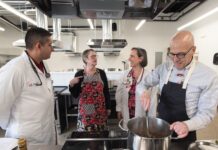
UofL News sat down with Eugene Mueller who is in his second year serving as Faculty Senate chair. In this Q&A, he elaborates on his role, as well as what he appreciates and hopes to further facilitate for UofL faculty.
UofL News: Tell us a bit about your position as professor of chemistry. How did you land at UofL and what interests you in this work?
Eugene Mueller: I started at UofL in August of 2007 – they hired me away from the University of Delaware, and I remain very happy with my decision to come here. In regard to how I ended up in chemistry? Well, spring break of my freshman year I was working on a lab report in my sister’s unfinished basement, and I read that “molecules have to collide in order to react.” I had taken two years of high school chemistry and half a year of college chemistry, and I never thought about how reactions happen. I’ve been hooked ever since that moment. I wanted to continue to do the research and learn more, but a big and delightful surprise is that teaching has proven to be equally rewarding.
UofL News: What motivated you to pursue the role of Faculty Senate chair?
Mueller: I decided I had two choices: I could either become a curmudgeon who just complains about decisions, or I could try to put myself in a position to make the decisions better.
UofL News: The Faculty Senate is tasked with many responsibilities. Which responsibility is most consistently appreciated by the faculty, considering its impact on faculty culture.
Mueller: We approve and give close scrutiny to new academic programs, and our recommendations are then forwarded to the Board of Trustees. While it is just a recommendation, we help change and clarify roles of those programs. We also frequently have the ability to get modifications in other matters and policy when we are a part of the process early. A major thing the senate chair does is provide the faculty with an explanation of why certain decisions are reached.
UofL News: What would you say are some of the unique benefits and opportunities of your position?
Mueller: The best thing is to be able to help guide policy development. Also, some of the invitations I receive have the great advantage of what I call “soft advocacy.” For instance, at a recent football game I could talk with some other trustees about a few things that are coming down the pike, and enjoy the informal socialization of getting to know each other better for the times we do have formal meetings.
UofL News: What are some of the unique challenges?
Mueller: The senate doesn’t make laws like the U.S. Senate. We are a part of governance, but for us that is mostly consultation, questioning and persuading the administration by voicing concerns. There are viewpoints which are very different between the appointed trustees versus the representative trustees. Some things, for example, from the budgetary point of view, may seem innocuous to appointed trustees, but they don’t seem that way to faculty. However, we can make a difference through persuasion, and that requires homework, analysis and good argument.
Much of what my predecessors and I have done is essentially invisible, taking place in confidential conversations. Often, all I can say to others is, “it’s not as bad as it might have been,” or “yes, that position was voiced,” but I cannot go into much more detail. In all cases when I have been bound by confidentiality, I feel the restriction on me to speak publicly was very reasonable. I’ve discovered that the administration and trustees really do want the staff, the faculty and the students to be happy here, to be productive. It’s something that’s very genuine. Exactly where priorities fall does not always please faculty, staff or students, and viewpoints are so different certainly for professional administrators who have not been faculty. But it’s an unavoidable fact that when someone puts on a new hat, their view changes because their responsibilities are so different. Yet, I have found the trustees and the administration very ready to listen. The tension of different viewpoints coming together is one reason it is called “shared governance.”
UofL News: Tell us something you have come to appreciate about the faculty culture here at UofL.
Mueller: I have been really impressed by how many of my colleagues are willing and ready to serve, and do it in a very reasonable and productive manner.
UofL News: What do you personally hope to accomplish for the faculty at UofL through your position?
Mueller:
- I am hoping for a more structured and lasting method of consultation before major decisions are taken. In particular, I hope for the development of the annual budget to include a broader consultation of more senators.
- Regarding presidential searches, the Redbook specifies an advisory committee made up of an elected faculty member from each school, but “it shall be consulted” is all it says. So, amending and clarifying that language is a current work in progress.
- I aim to spread the culture of consultation to campus construction projects, giving more thought to the impact on pedestrians and traffic.
UofL News: What is an element of Faculty Senate that you wish people better understood?
Mueller: I wish people understood that the senate represents all the faculty, including junior faculty, part-time faculty and part-time lecturers. They can talk to their senators or to me if there is a problem, because we can be proactive. The summaries of our meetings are beneficial and informative for any faculty to read. While in my position, I would like as much input as possible.
To learn more about the Faculty Senate, visit the Faculty Senate website.































